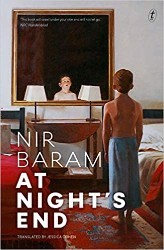Masha Kogan is a permanently displaced immigrant struggling through a free-floating dangerous world. She and her parents, a Jewish music teacher mother and a failed Russian cosmonaut father, fled Azerbaijan in the 1990s during the tumultuous breakup of the U.S.S.R. where they were in constant danger and suffered a meager existence. Masha has witnessed the horrific violence of the Armenian pogroms. Although many of her family members were murdered in the Holocaust, when their papers finally come through the Kogans decide to settle in Frankfurt, Germany rather than an unstable Israel.
Masha is a constant outsider and outcast in her German schools. She excels in languages and hopes to become a world-class translator. Her choice to tie herself to the languages of many lands is interesting, as she feels untied to any national allegiances or identities herself.
When Elias, her German boyfriend, dies from complications of a soccer injury, Masha is again thrown into a dark and haunted place as she flounders, aches, and grasps at an unknown future. Masha’s narration vividly and often humorously makes the reader feel the omnipresent feeling of danger she lives with.
After Elias’s death Masha travels to Tel Aviv to work as a translator for a German firm. This move places her in a political and cultural landscape fraught with old and new challenges and entanglements. Masha takes part in Israeli life, but feels little connection to the country. She often feels she should defend a way of life she has personally rejected to her many Arab friends. Arabic is one of her many languages, but she has never studied Hebrew. Masha brings her troubled past, fears, and panics with her as she moves through social and romantic relationships in her new surroundings. Many of the characters who enter into Masha’s stormy world are also immigrants who are disassociated from their own ethnic backgrounds and lands.
Masha keeps looking for a purpose as she tries to outrun her tragedies and grief. She does not want to be defined by her refugee status, her Judaism, or her loves. She yearns for a new way to view the world. Is it possible to defy stereotypes and break barriers in a political world?
Grjasnowa, whose biography somewhat echoes Masha’s, writes in the open voice and mood of her generation. She explores new global relationships and makes one understand the political, cultural, and emotional toll of not belonging on the immigrant’s soul.
All Russians Love Birch Trees is an important and current book. A strong and thoughtful read!
Renita Last is a member of the Nassau Region of Hadassah’s Executive Board. She has coordinated the Film Forum Series for the Region and served as Programming and Health Coordinators and as a member of the Advocacy Committee.
She has volunteered as a docent at the Holocaust Memorial and Tolerance Center of Nassau County teaching the all- important lessons of the Holocaust and tolerance. A retired teacher of the Gifted and Talented, she loves participating in book clubs and writing projects.



